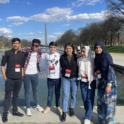Muskan, a student from Pakistan, discusses her experience attending Civic Education Week.
As a reminder of the Arab custom, a hand-lettered sign on Suha Abbasi’s front door asked guests to please remove their shoes upon entering.
When they crossed the threshold, Omar of the West Bank and Abdoo of Egypt felt as though they had been transported home. The scent of Middle Eastern food wafted from the kitchen/dining area. Arabian music was just beyond. A smaller room to the right of the entrance hall contained a prayer rug.
For the two exchange students, dinner the night of February 26 seemed like a journey home. For the rest of us, it was a feast of flavors and a memorable cultural exchange.
Our group consisted of the Kennedy-Lugar Youth Exchange and Study (YES) students hosted this year by East Noble AFS. In addition to Abdoo and Omar, they are Monique of South Africa, Jasmine of Indonesia, Lubna of Pakistan and Nayla of Bahrain.
YES is funded by the U.S. Department of State's Bureau of Educational and Cultural Affairs.
Accompanying the students were my husband Terry and I, the Rev. Dan and Joyce Barker, Cathy Linsenmayer and Alisa Bloom. Our hosts were Suha Abbasi and her two children, Laddan, a resident director at Indiana University — Purdue University, Fort Wayne, and Mohamad, a junior at Homestead High School.
Suha Abbasi was born in Palestine but she didn’t live there very long. As with many Palestinians, her family left Palestine in order to obtain economic stability. Her father found a job in Kuwait as a teacher. Every summer they would return to Palestine for a vacation. In the summer of 1967, while they were preparing for their vacation, there was an attack in Palestine and they couldn’t travel back there.
Suha Abbasi and her children came to Fort Wayne in 2005. They had been living in Chicago, where there is a very large Palestinian community, but she decided Fort Wayne was where she wanted to raise her children.
In 2012, as a student at IPFW, she met Dr. Michael Spath, director of the Indiana Center for Middle East Peace. She traveled with him and other people who were interested in Palestine, and has been involved with the ICMEP ever since.
“My kids and I travel to Palestine frequently. We all greatly enjoy going back there,” she said. “We hope to go back in the near future.”
Mohamad visited relatives in Jordan in January and brought back some of the confections we enjoyed following our bountiful main meal. Although we sat at two large tables for the main dishes, for dessert we chose to sit on the carpeted floor in the room with the sofas. (Sometimes people in the Middle East choose to sit on the floor when they eat.) We relaxed and enjoyed bountiful fresh fruit and amazing confections featuring dates, figs, almonds, pistachios, honey and other sweet flavors.
Suha Abbasi is finishing her last semester at IPFW. One of her goals is to begin a catering business. From what we experienced, her warmth, culinary skill and artistic flair will make her highly successful.
In general, Arabian cooking is economical, nutritious and extremely tasty, with numerous vegetables and ample poultry, beef and mutton. It is usually prepared in large quantities with a great number of dishes to choose from. When the 15 of us had finished eating, the serving dishes looked as though we had barely begun. But Suha Abbasi was prepared — she gave each of us containers to fill with our favorite dishes to take home and enjoy.
I have included Suha Abbasi’s recipe for Ma’Loobe, which means “upside down.” This dish, which is served throughout the Middle East, has many variations.
In January Omar and I prepared a Palestinian version in our home, using his mother’s recipe. Omar calls it “Maklooba.” This link will take you to Omar’s Maklooba recipe, which does not include eggplant: http://bit.ly/1c9eZ3T

Suha Abbasi’s Ma’Loobe
Peel and slice one large eggplant. Sprinkle the slices with salt. After 15 minutes, turn the slices over and salt the other side. Rinse 1 3/4 cups rice. Place the rice, 3 1/4 cups water, 1 large beef bouillon cube, 1 teaspoon salt, 1/4 cup butter in a Teflon lined sauce pan. Bring to a boil. After about 10 minutes, when the level of rice and water are about equal, reduce the heat and cover, cooking until all the water is absorbed, about 25 minutes.
Saute 1/2 cup pine nuts in 1/4 cup butter until they big to turn color. Use a large, deep, Teflon-lined pan with deep sides. Be very careful. They can burn quickly. Remove with a slotted spoon.
Coarsely chop 1/2 pound beef filet. Season with salt and pepper and brown in the same butter until just barely done.
Return the pine nuts to the pan with the meat and spread evenly over the bottom.
Rinse each slice of eggplant. Press firmly between paper towels to remove juices. Fry the slices in oil until they are golden, turning once. Drain on paper towels.
Arrange the eggplant in one layer on top of the meat and pine nuts. Cover with the cooked rice. Press down firmly.
Melt 1 tablespoon butter in 2 tablespoons water. Drizzle over the rice. Cover and cook over very low heat for 10-15 minutes. Then turn off the heat and let the pan rest for 10 minutes, without uncovering.
Unmold onto a large serving platter. Serve with cucumber and yogurt salad.
Original story published in KPC News and written by Grace Housholder
Photos courtesy Grace Housholder. Top: Pictured from left are Lubna of Pakistan, Omar of the West Bank, Jasmine of Indonesia, Suha (their host) a native of Palestine, Monique of South Africa, Abdoo of Egypt and Nayla of Bahrain. Bottom: Omar from West Bank fills his plate.






